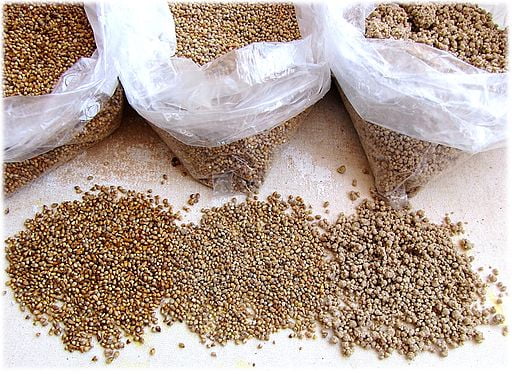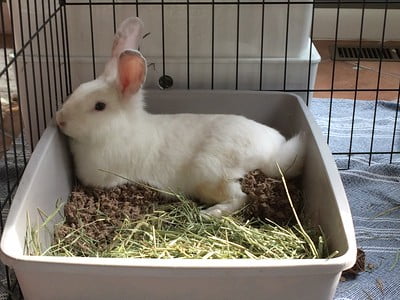Last Updated on February 23, 2023 by Marjon Ramos
It’s no question that vegetables should be included in a rabbit’s daily diet. But what others failed to discuss is the types of vegetables that are best for rabbits.
My two rabbits, Tyr and Freya, love their veggies. In fact, they probably love it too much. I should cut the amount I gave them because they’re refusing to eat hay sometimes.
As far as veggies go, asparagus is probably at the lower end of the list when it comes to the favorites of my rabbits. It’s not that rabbits don’t like asparagus; some do, but my babies definitely prefer other veggies.
In this article, I will be talking about whether it’s okay for a rabbit to eat asparagus. I would also touch on how much asparagus a rabbit can eat based on its age. And finally, I would also discuss the different risks of overfeeding asparagus to rabbits.
So without further ado, let’s get started.
Table of Contents
Do rabbits like eating asparagus?
Some rabbits like asparagus, but others can’t be bothered with it. It really depends on the rabbits.
Not all rabbits are the same in terms of food preference. For example, my two rabbits, Tyr and Freya, have different preferences when it comes to food. Tyr likes veggies, while Freya prefers herbs.
Is asparagus safe to be eaten by rabbits?
Yes, asparagus is safe to be eaten by rabbits in small amounts occasionally. There are other vegetables that are better for rabbits compared to asparagus, but they can still eat it if your rabbit likes asparagus.
Is asparagus good for rabbits?
Asparagus is good and can be given to rabbits in small amounts. The reason you don’t want to feed asparagus to rabbits in large amounts is that asparagus contains large amounts of water and not enough fiber.
Feeding your rabbit too much asparagus could soften their stool and cause diarrhea, uneaten caecotrophs, or GI stasis.
What are the benefits of feeding asparagus to rabbits?
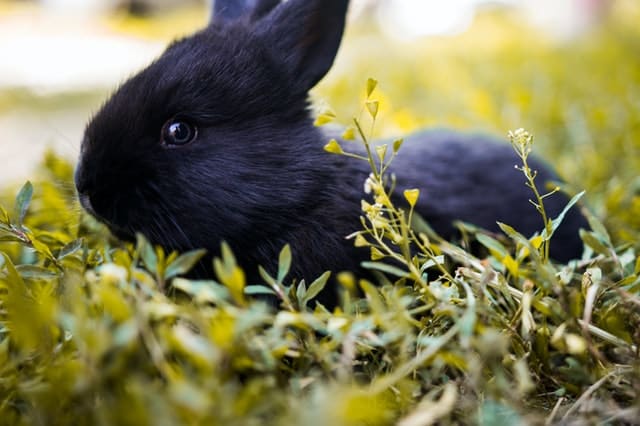
Gist:
Asparagus contains fructo-oligosaccharides, which are seen to reduce morbidity when a rabbit has E. coli.
Varga, Molly, and Frances Harcourt-Brown. Textbook of Rabbit Medicine: Revised and Edited. Elsevier, 2014.
According to the book Textbook of Rabbit Medicine, plants such as asparagus contain fructo-oligosaccharides, which have been called “prebiotics” because they’re similar to probiotics that encourage the growth of good bacteria.
Fructo-oligosaccharides that are found in asparagus also increase the absorption of minerals like magnesium, calcium, and iron. Because of these benefits, fructo-oligosaccharides are now included in many commercial rabbit foods available on the market.
Warning:
Although asparagus have these benefits, overfeeding your rabbit is not recommended. This is only to inform you of the different vitamins and minerals your rabbit can get when you give them asparagus.
How much asparagus can a rabbit eat?
Asparagus should only be fed in small amounts. The reason for that is that asparagus is high in water content and could lead to softer stool.
Adult or fully grown rabbits
Adult or fully grown rabbits (more than 7 months old) can be given asparagus as an occasional treat. You can give your rabbits a small 2 inch piece of asparagus as a treat.
Giving your rabbit more or feeding asparagus as part of your rabbit’s daily diet could lead to uneaten caecotrophs and diarrhea due to the high amounts of water in asparagus.
Asparagus has high amounts of water. Giving your rabbit more asparagus could lead to uneaten caecotrophs and diarrhea. Don’t make them part of your rabbit’s regular diet.
Young or growing bunnies.
Young rabbits or bunnies that are less than 12 weeks old should not be given any asparagus. Young rabbits need to focus on eating alfalfa hay.
When you’re planning on giving your bunnies asparagus for the first time, make sure that you give it to them slowly. Doing so would give their gut flora time to adjust to the new food.
Pregnant or lactating rabbits
Although pregnant or lactating rabbits can eat asparagus, it’s much better for them to focus on eating hay and pellets. Make sure that the pellets and hay you buy are specifically for pregnant rabbits.
Pregnant rabbits should focus on getting the most efficient food they can eat so that their babies can properly develop.
When can rabbits start eating asparagus?
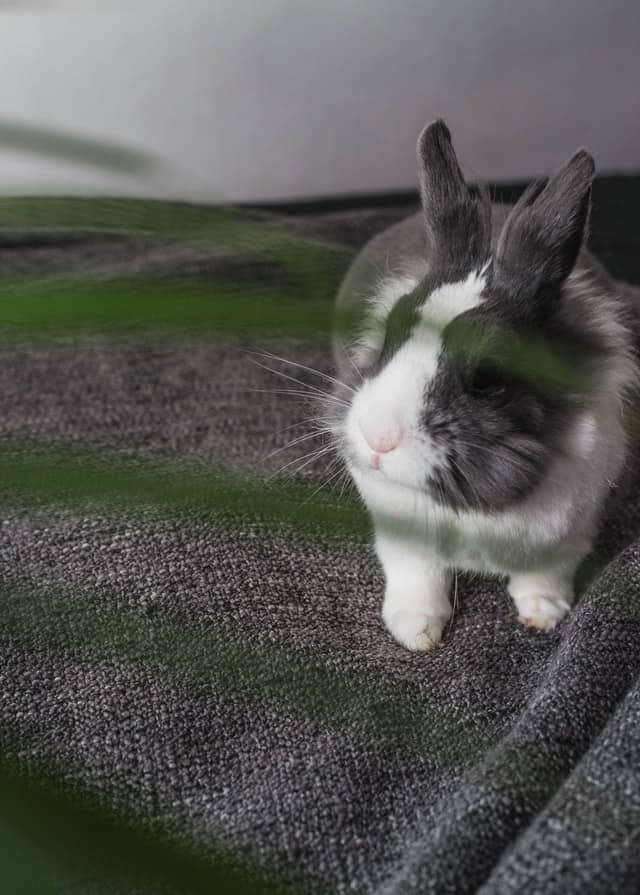
Gist:
You can slowly start incorporating asparagus into your rabbit’s diet at 12 weeks old.
You can start giving your rabbits asparagus at 12 weeks old. Just make sure that you go slow at first.
Also, you should only incorporate one vegetable at a time so that you’ll know if certain vegetables are causing digestive problems.
Here’s a table to guide you on how much you should feed your bunnies as they get older.
| Age | Hay | Pellets | Vegetables | Fruits |
|---|---|---|---|---|
| 7 weeks to 7 months | Unlimited alfalfa | Unlimited | — | — |
| 12 weeks | Unlimited alfalfa | Unlimited | Introduce vegetables (one at a time) in small quantities < 1/2 oz (15 g) | — |
| 7 months to 1 year | Introduce grass hay, decrease alfalfa | Decrease amount fed to ½ cup per 6 lbs (2.7 kg) BW | Increase vegetables fed daily gradually | No more than 1-2 oz (30-60g) per 6 lbs (2.7 kg) BW |
| Adult (1-5 y) | Unlimited grass hay, oat hay, straw | ¼ to ½ cup per 6 lbs (2.7 kg) BW | 1-2 cups per 6 lbs (2.7 kg) BW | No more than 2 tbsp per 6 lbs (2.7 kg) BW |
| Seniors (>6 y) | Increase alfalfa hay fed to frail, older rabbits but monitor calcium levels | Continue adult diet if weight is okay; frail, older rabbits may fed unlimited pellets |
When should you not feed asparagus to rabbits?
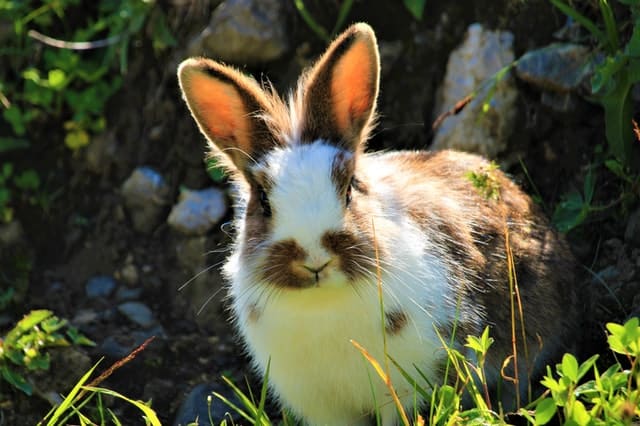
Gist:
You should not feed asparagus to rabbits that are having digestive issues like diarrhea or uneaten caecotrophs.
Rabbits that are already experiencing digestive issues should only eat hay. Feeding your rabbit asparagus, which is 94% water, could make their stool softer. Which could lead to worsening the digestive issues.
If you notice any changes in your rabbit’s stool, immediately stop feeding any other food except hay and water.
You should also immediately bring your rabbit to a veterinarian. Diarrhea or gastrointestinal stasis in rabbits could be fatal if not treated immediately.
Risk of overfeeding asparagus to rabbits.
Uneaten caecotrophs
Uneaten caecotrophs happen when your rabbit’s stool is too soft. This condition mainly happens due to diets that are low in fiber or rabbits that are not eating enough hay.
Asparagus could soften the rabbit’s stool due to its high water content. But, if you feed your rabbits enough hay, it shouldn’t be a problem.
Gastrointestinal stasis
Gastrointestinal stasis is also possible if the majority of your rabbit’s diet consists of vegetables like asparagus. The reason is that asparagus doesn’t have enough fiber and could disrupt your rabbit’s gut flora.
Your rabbit’s diet should consist of 80-90% hay, 10% vegetables, 5% pellets, and occasional treats.
Diarrhea
Overfeeding of asparagus could also lead to diarrhea because asparagus is high in water content. This could soften your rabbit’s stool. Also, asparagus is low in fiber and should only be given as a treat.
If your rabbit is suffering from diarrhea, bring your rabbit to a veterinarian immediately. Rabbits can die from diarrhea if it’s not treated immediately.
Great alternatives to asparagus.
The key to a healthy diet for rabbits is variety. You have to mimic what a rabbit eats in the wild for a healthy and happy rabbit.
In the wild, a rabbit would eat a variety of vegetables and fruits each day.
Here’s a list of vegetables and leafy greens that are recommended for rabbits.
- Spinach
- Celery
- Green peppers
- Basil
- Mint
- Alfalfa, radish & Clover sprouts
- Beet greens (tops)
- Parsley
- Peapods (the flat edible kind)
- Peppermint leaves
- Bok choy
- Escarole
- Clover
- Peppermint leaves
- Carrot & carrot tops
- Radicchio
- Raspberry leaves
- Wheatgrass
- Watercress
- Cilantro
- Dandelion greens and flowers (no pesticides)
FAQ (Frequently Asked Questions)
Can rabbits eat asparagus stems?
Yes, rabbits can eat asparagus stems. But it’s best to avoid feeding it to your rabbit too much because it could soften their stool.
Can rabbits eat asparagus ends?
Yes, rabbits can eat asparagus ends. Just make sure that you wash it first before giving it to your rabbits. This would ensure that unwanted chemicals are removed before feeding it to your rabbits.
Can rabbits eat asparagus leaves?
Yes, rabbits can eat asparagus leaves. Just remember to wash your asparagus leaves before giving them to your rabbits. Some rabbits dislike asparagus leaves, though.
Do wild rabbits eat asparagus?
Yes, wild rabbits eat asparagus. If you have one in your garden and there is a population of rabbits around, then you should protect your plants.
Can rabbits eat asparagus stalks?
Yes, rabbits can eat asparagus stalks. Just don’t feed them too much and only give them occasionally.
Can rabbits eat raw asparagus?
It doesn’t matter whether the asparagus is raw or cooked; rabbits can eat both without a problem. Cooked asparagus would just be softer to munch on, which some rabbits prefer. Just make sure that you don’t overfeed asparagus, whether cooked or raw.
Conclusion
Asparagus should only be fed to rabbits in small amounts. Asparagus contains a lot of water and could lead to softer stool, diarrhea, GI stasis, and uneaten caecotrophs if fed in large amounts.
Make sure that you only give your rabbit asparagus once or twice a week and only in small amounts.
If you notice any changes in your rabbit’s stool, immediately bring your rabbit to a veterinarian.
Finally, make sure that your rabbit is old enough to eat vegetables like asparagus. Rabbits that are less than 12 weeks old should only eat hay.
Cite this article:
Related Articles
- Can Rabbits Eat Tomatoes? What You Need To Know.
- Can Rabbits Eat Watermelon? What You Need To Know.
- Can Rabbits Eat Grapes? What You Need To Know.
- Can Rabbits Eat Broccoli? What You Need To Know.
- Can Rabbits Eat Apples? What You Need To Know.
- Can Rabbits Eat Cabbages? What You Need To Know.
- Can Rabbits Eat Strawberries? What You Need To Know.
- Can Rabbits Eat Bananas? What You Need To Know.
- Can Rabbits Eat Oranges? 9 things you need to know.
- Can Rabbits Eat Blueberries? Here’s Why.
- Can Rabbits Eat Spinach? Your Questions Answered.
- Can Rabbits Eat Cucumbers? Here’s Why.
- Can Rabbits Eat Celery? What you need to know.
- Can Rabbits Eat Radishes: Everything You Need To Know
Sources
- Blas, Carlos de., and Julian Wiseman. The Nutrition of the Rabbit. CAB International, 1998.
- Buseth, Marit Emilie., and Richard A. Saunders. Rabbit Behaviour, Health, and Care. CABI, 2014.
- Cheeke, Peter R. Rabbit Feeding and Nutrition. Academic Press, 1987.
- Lebas, F. The Rabbit: Husbandry, Health, and Production. Food and Agriculture Organization of the United Nations, 1997.
- Meredith, Anna, et al. BSAVA Manual of Rabbit Medicine. British Small Animal Veterinary Association, 2014.
- Patry, Karen, et al. The Rabbit-Raising Problem Solver: Your Questions Answered about Housing, Feeding, Behavior, Health Care, Breeding, and Kindling. Storey Publishing, 2014.
- Richardson, V. C. G. Rabbits: Health, Husbandry and Diseases. Blackwell Science, 2002.
- Varga, Molly, and Frances Harcourt-Brown. Textbook of Rabbit Medicine: Revised and Edited. Elsevier, 2014.
- Basic Rabbit Care
- Gastrointestinal stasis

